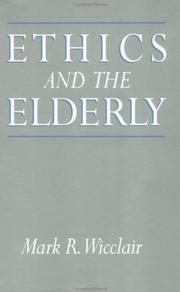| Listing 1 - 4 of 4 |
Sort by
|
Book
ISBN: 9780521514316 9780521735438 9780511973727 Year: 2011 Publisher: Cambridge Cambridge university press
Abstract | Keywords | Export | Availability | Bookmark
 Loading...
Loading...Choose an application
- Reference Manager
- EndNote
- RefWorks (Direct export to RefWorks)
"The subject of this book is conscientious objection in health care and the principal aim is to provide an ethical analysis of conscience-based refusals by physicians, nurses, and pharmacists. Before considering ethical issues, however, it is essential to understand what conscientious objection is, which calls for conceptual analysis. A person engages in an act of conscientious objection when she refuses to perform an action, provide a service, and so forth on the grounds that doing so is against her conscience. In the context of health care, physicians, nurses, and pharmacists engage in acts of conscientious objection when they: 1) refuse to provide legal and professionally accepted goods or services that fall within the scope of their professional competence, and 2) justify their refusal by claiming that it is an act of conscience or is conscience-based"--Provided by publisher.
Conscience. --- Conscientious objection. --- Delivery of Health Care --- Ethics, Clinical. --- Medical ethics. --- Refusal to Treat --- Refusal to treat. --- ethics. --- Conscientious objection --- Medical ethics --- Refusal to treat --- Physician refusal to treat --- Treat, Refusal to --- Medical personnel and patient --- Biomedical ethics --- Clinical ethics --- Ethics, Medical --- Health care ethics --- Medical care --- Medicine --- Bioethics --- Professional ethics --- Nursing ethics --- Social medicine --- Military ethics --- War --- Moral and ethical aspects
Book
ISBN: 1139097288 1107215684 128330693X 9786613306937 1139103083 0511973721 1139100629 1139101285 1139098594 1139099264 0521514312 0521735432 Year: 2011 Publisher: Cambridge : Cambridge University Press,
Abstract | Keywords | Export | Availability | Bookmark
 Loading...
Loading...Choose an application
- Reference Manager
- EndNote
- RefWorks (Direct export to RefWorks)
Historically associated with military service, conscientious objection has become a significant phenomenon in health care. Mark Wicclair offers a comprehensive ethical analysis of conscientious objection in three representative health care professions: medicine, nursing and pharmacy. He critically examines two extreme positions: the 'incompatibility thesis', that it is contrary to the professional obligations of practitioners to refuse provision of any service within the scope of their professional competence; and 'conscience absolutism', that they should be exempted from performing any action contrary to their conscience. He argues for a compromise approach that accommodates conscience-based refusals within the limits of specified ethical constraints. He also explores conscientious objection by students in each of the three professions, discusses conscience protection legislation and conscience-based refusals by pharmacies and hospitals, and analyzes several cases. His book is a valuable resource for scholars, professionals, trainees, students, and anyone interested in this increasingly important aspect of health care.
Medical ethics. --- Conscientious objection. --- Refusal to treat. --- Physician refusal to treat --- Treat, Refusal to --- Medical personnel and patient --- Military ethics --- War --- Biomedical ethics --- Clinical ethics --- Ethics, Medical --- Health care ethics --- Medical care --- Medicine --- Bioethics --- Professional ethics --- Nursing ethics --- Social medicine --- Moral and ethical aspects --- Arts and Humanities --- Philosophy

ISBN: 019505315X Year: 1993 Publisher: New York Oxford University Press
Abstract | Keywords | Export | Availability | Bookmark
 Loading...
Loading...Choose an application
- Reference Manager
- EndNote
- RefWorks (Direct export to RefWorks)
Medical ethics --- Decision Making - in old age. --- Life Support Care - in old age.
Digital
ISBN: 9780511973727 Year: 2011 Publisher: Cambridge Cambridge University Press
Abstract | Keywords | Export | Availability | Bookmark
 Loading...
Loading...Choose an application
- Reference Manager
- EndNote
- RefWorks (Direct export to RefWorks)
| Listing 1 - 4 of 4 |
Sort by
|

 Search
Search Feedback
Feedback About UniCat
About UniCat  Help
Help News
News